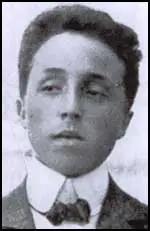August Kubizek

August Kubizek, the only surviving child of Michael and Maria Kubizek, was born on 3rd August 1888. He had three sisters but they all died in childhood. After leaving school he found work with a upholsterer in Linz, Austria.
Kubizek met Adolf Hitler at a opera house in 1904. As Louis L. Snyder has pointed out: "Before long August began to regard his chance acquaintance as his best friend. The two subsequently became roommates and took frequent walks through the town and went on country excursions. The serious, tense, and meticulous Adolf dominated his friend, who served as a kind of audience." August later claimed that Hitler felt very strongly about political issues: "It seemed like a volcano erupting. It was as though something quite apart from him was bursting out of him."
Hitler's mother, Klara Hitler, was operated on for breast cancer in February, 1907. Kubizek went to visit her: "Frau Klara seemed more careworn than ever. Her face was deeply lined. Her eyes were lifeless, her voice sounded tired and resigned. I had the impression that, now that Adolf was no longer there, she had let herself go, and looked older and more ailing than ever. She certainly had concealed her condition from her son to make the parting easier for him. Or perhaps it was Adolf's impulsive nature that had kept up her vitality. Now, on her own, she seemed to me an old, sick woman."
Kubizek dreamt of becoming a conductor and in 1908 Kubizek left his upholsterer's shop and journeyed to Vienna to study the viola at the Academy of Music. Hitler joined him as he intended to study art in the city. The two men roomed together at No. 29 Stumper Alley. However, Hitler was rejected by the Academy of Fine Arts, a blow from which he never recovered. Kubizek claims that Hitler took the news very badly: "Choking with his catalogue of hates, he would pour his fury over everything, against mankind in general who did not understand him, who did not appreciate him and by whom he was persecuted and cheated... I had the impression that Adolf Hitler became unbalanced."
Kubizek completed his studies in 1912 and was hired as conductor of the orchestra in Marburg. In 1914 he married Anna Funke and over the next few years she gave birth to three sons (Augustin, Karl Maria and Rudolf). On the outbreak of the First World War he joined the Austro-Hungarian Infantry. He was wounded in 1915 and after making a full recovery he returned to action.
After the war he became an official in the municipal council of Eferding, Upper Austria. In 1933 Kubizek sent Adolf Hitler a letter congratulating him on becoming Chancellor of Germany. Hitler replied but did not meet Kubizek until 9th April 1938 during a visit to Linz. Hitler offered to arrange for Kubizek to conduct one of Germany's leading orchestra. When his friend politely refused, Hitler insisted on financing Kubizek's three sons education at the Anton Bruckner Conservatory. Hitler also hired Kubizek to write two short propaganda booklets about Hitler's early life.
Kubizek was arrested in December 1945 and was imprisoned and interrogated by United States Army officers. He was not released until 8th April 1947. His book, The Young Hitler I Knew, was published in 1953. Ian Kershaw has argued in Hitler 1889-1936 (1998): "Kubizek's post-war memoirs need to be treated with care, both in factual detail and in interpretation. They are a lengthened and embellished version of recollections he had originally been commissioned by the Nazi Party to compile... However, for all their weaknesses, his recollections have been shown to be a more credible source on Hitler's youth than was once thought... There can be no doubt that, whatever their deficiencies, they do contain important reflections of the young Hitler's personality, showing features in embryo which were to be all too prominent in later years."
August Kubizek died on 23rd October 1956.
Primary Sources
(1) August Kubizek, Young Hitler: The Story of our Friendship (1953)
Frau Klara seemed more careworn than ever. Her face was deeply lined. Her eyes were lifeless, her voice sounded tired and resigned. I had the impression that, now that Adolf was no longer there, she had let herself go, and looked older and more ailing than ever. She certainly had concealed her condition from her son to make the parting easier for him. Or perhaps it was Adolf's impulsive nature that had kept up her vitality. Now, on her own, she seemed to me an old, sick woman.
(2) Ian Kershaw, Hitler 1889-1936 (1998)
Kubizek's post-war memoirs need to be treated with care, both in factual detail and in interpretation. They are a lengthened and embellished version of recollections he had originally been commissioned by the Nazi Party to compile... However, for all their weaknesses, his recollections have been shown to be a more credible source on Hitler's youth than was once thought... There can be no doubt that, whatever their deficiences, they do contain important reflections of the young Hitler's personality, showing features in embryo which were to be all too prominent in later years.
